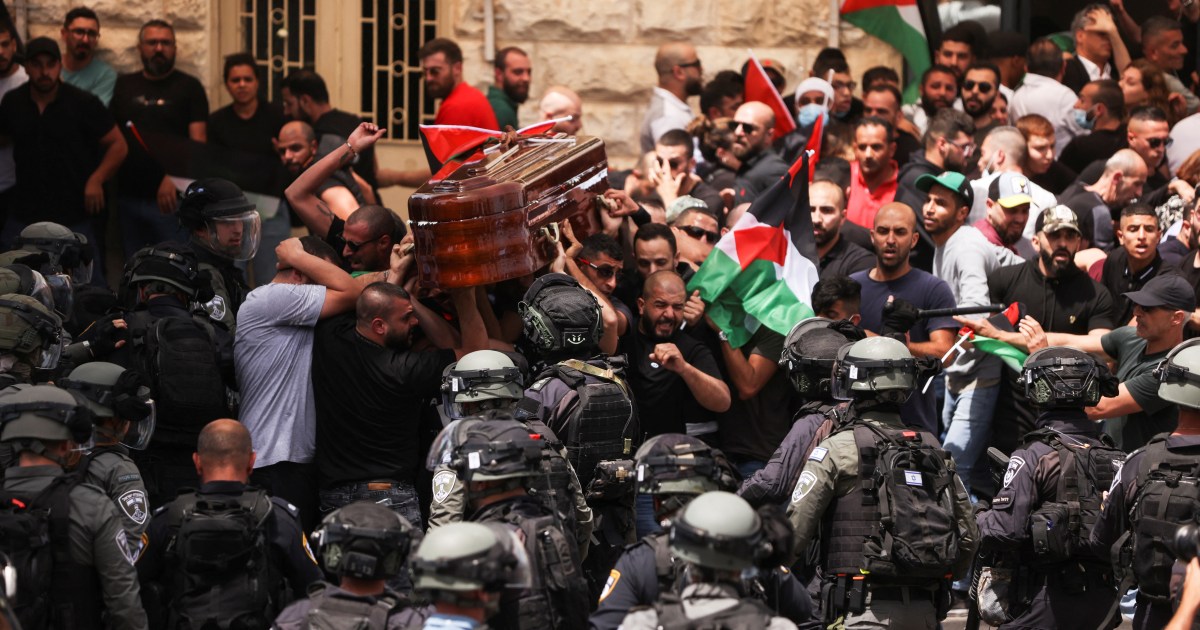Israel’s policy: Kill the messenger, attack the mourners
On Friday, May 13, The New York Times website ran the headline “Israeli Police Attack Funeral of Slain Palestinian Journalist”, which was then updated to “Israeli Police Attack Mourners at Palestinian Journalist’s Funeral”. The journalist in question, of course, was 51-year-old Shireen Abu Akleh, the veteran Al Jazeera reporter shot in the head and killed by Israeli forces on Wednesday in the occupied West Bank.
As the Times reported, Israeli police officers had commenced “beating and kicking mourners” at the funeral procession in Jerusalem, thereby “forcing pallbearers to nearly drop the coffin”. This, at least, was mercifully straightforward information coming from the same news outlet that had just days before opted to use the noncommittal phrase “Dies at 51” in its announcement of Abu Akleh’s murder.
The US newspaper of record has also been known for such journalistic perversions as reducing the 2014 Israeli military slaughter of four Palestinian children playing football in the Gaza Strip to the following headline: “Boys Drawn to Gaza Beach, and Into Centre of Mideast Strife”. One might well have expected a May 13 summary from the Times along the lines of: “Coffin Nearly Falls at Journalist’s Funeral, In Regrettable Embodiment of Israeli-Palestinian Conflict”.
Over the course of her dedicated career, Abu Akleh herself embodied Palestinian humanity by speaking truth to power. Now, the occupying power has spoken back by shooting her in the head and attacking her mourners – a response that can only be classified as acute and multitiered state savagery, in keeping with Israel’s modus operandi of refusing to let Palestinians live, die, or be buried in peace.
There is also the matter of not allowing dead and buried Palestinians to remain dead and buried in peace, which is what happens when, for example, the Israeli military undertakes to bomb cemeteries in Gaza – as though it were somehow possible to retroactively obliterate Palestinian existence by blowing up bones.
To be sure, Israeli attacks on funerals are nothing new – which no one should really find surprising given Israel’s track record of attacking ambulances, hospitals, medical personnel, schools, United Nations compounds, apartment buildings, animals, trees, babies, and pretty much anything else that can be attacked.
Recall the July 29, 2021 assault by Israeli forces on the funeral of 12-year-old Mohammed al-Alami, who had been shot in the chest by Israeli soldiers the previous day as he travelled in a car with his father in the West Bank town of Beit Omar. Al-Alami’s funeral, in turn, led to another: that of 20-year-old Shawkat Awad from the same town, who was killed by Israeli fire while mourning al-Alami.
In another case illustrating Israel’s apparent fetish for funeral attacks, Israeli security forces were unleashed against the March 2, 2022 funeral for 19-year-old Palestinian student Ammar Abu Afifa, killed by an Israeli bullet in the Al-Aroub refugee camp north of Hebron. Even the Times of Israel, a fiercely Zionist outfit, felt compelled to run the headline: “Israeli troops shot dead a Palestinian teen. The army hasn’t said what he did wrong”.
Fast forward two months to Abu Akleh’s funeral, and the violent footage of baton-wielding Israeli police has earned a rare denunciation from outgoing White House press secretary Jen Psaki, who described the scenes as “deeply disturbing”. Not that the United States does not engage in deeply disturbing behaviour on a regular basis, including vis-à-vis funerals.
Anyway, Israel and the US have long been two peas in a sadistic pod; Israeli malevolence simply has a more intense geographic focus. Incidentally, May 15 – a mere two days after Abu Akleh was buried in Jerusalem – marks the seventy-fourth anniversary of the Nakba, when Palestinians mourn the founding of the state of Israel on Palestinian land in 1948. This entailed the destruction of more than 500 Palestinian villages, the killing of more than 10,000 Palestinians, and the expulsion of at least three-quarters of a million more – the start of a bloody trajectory that continues to this day.
Unfortunately for Israel, however, Palestinian identity cannot be eradicated at the barrel of a gun; nor will Palestinians spontaneously forget their existence now that Israeli security forces have arrested mourners for carrying the Palestinian flag at Abu Akleh’s funeral. And as Israel drives the final nails into the coffin of its own projected image of humanity, the truth is that any pretensions to Israeli humaneness should have been buried a long time ago.
The views expressed in this article are the author’s own and do not necessarily reflect Al Jazeera’s editorial stance.




